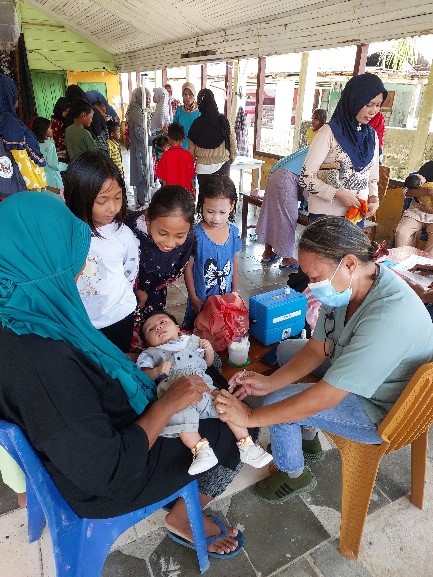Globally, the administration of multiple injections to infants has been a routine practice for over a decade, demonstrating no adverse effects on infants or immunization programmes. Nonetheless, Marlyn Manuputty, an immunization coordinator at the community health centre Piru in the Seram Bagian Barat district of Maluku, still faces questions and concerns from parents regarding the safety of multiple injections. Addressing these parental concerns is pivotal to ensuring the effectiveness of immunization programmes.
"Some common questions posed by caregivers include concerns about the safety of their infants receiving two or more vaccine injections simultaneously. They often inquire whether it might be safer to administer one type of antigen during one immunization schedule and another during the next," explained Marlyn Manuputty.
On 25 May 2023, WHO Indonesia, in collaboration with the district health office of Seram Bagian Barat district, conducted a supportive supervision visit to the integrated health post (Posyandu) on Osi island. During the supervision, vaccinators raised concerns regarding the safety of administering multiple injections, a factor that had been dissuading parents from granting consent for their children to receive these vaccinations. Children under the age of five are particularly susceptible to vaccine-preventable diseases, including polio, diphtheria, and pertussis. The development of multiple injection schedules is rooted in pre- and post-licensure safety and effectiveness data, including studies on simultaneous administration. Deliberately delaying immunization would be irresponsible and could leave children vulnerable. Research has also demonstrated that recommended vaccines are as safe and effective when administered in combination as they are individually.

Laukay Anike Maanana, a dedicated vaccinator at Puskesmas Piru in Seram Bagian Barat, Maluku, administered multiple injections at the Posyandu on Osi Island. In one go, a two-month-old baby received the second dose of OPV vaccine, the first dose of Pentabio vaccine (DPT-HB-Hib) and the first dose of Pneumococcal Conjugate Vaccine (PCV). (WHO/Victor Mangu)
These critical messages were effectively conveyed to parents and caregivers at the Posyandu on Osi island, leading to increased acceptance among parents and caregivers for their children to receive multiple vaccinations. Providing reassurance and responding clearly and effectively to caregivers’ queries were among the pivotal strategies that bolstered parental acceptance.
Recognizing that Posyandus throughout the region may confront similar challenges in promoting multiple injections, it is crucial to implement comprehensive solutions. These solutions involve not only providing reassurance and adeptly addressing caregivers’ inquiries but also fostering the capacity of healthcare workers. WHO Indonesia, in partnership with the provincial health office of Maluku province, conducts targeted capacity-building initiatives and routine supportive supervision for health workers. These efforts are designed to enhance their skills and confidence in educating caregivers about the advantages of multiple injections. By consistently delivering a clear and purposeful message, healthcare workers can cultivate heightened trust and acceptance among parents, thereby leading to an overall improvement in immunization rates.
This activity is supported by the Australian Government Written by Victor Pati Mangu, Vaccination Technical Officer, WHO Indonesia.
